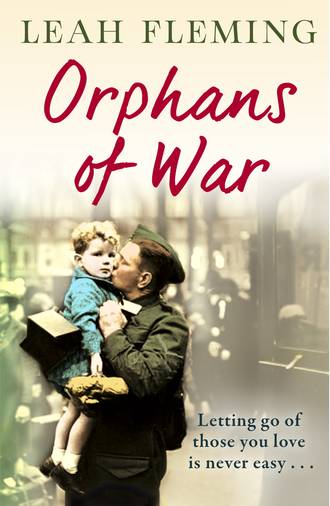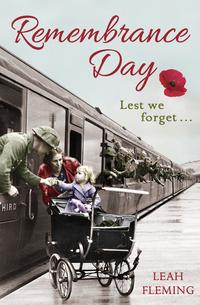
Полная версия
Orphans of War
It was time she did some war work, and a house full of geriatric relatives hoping to sit out the war in comfort was not her idea of keeping the home fires burning.
‘My daughter-in-law has other responsibilities. There’s the house to run, and with so few servants I shall need her services,’ Pleasance countered quickly, sensing danger.
‘With respect, madam, I have checked, and Mrs Belfield is registered for war work, being of age, available and without children. It is her duty—’
‘How dare you come here and demand such sacrifices from a married woman? In my day, men like you…This is unacceptable to me—’
‘Mother, he’s got a point. I would like to help where I can,’ Plum interrupted. ‘We all have to make sacrifices. Gerald is doing his bit and now I must do mine. I shall only be down the lane.’
‘Who will make up the four for bridge?’ Mother sighed. ‘I don’t know what the world is coming to…I shall write to the West Riding and complain about your attitude, young man.’
‘You can do that, madam, but I have powers to insist that the stable block and servants quarters’ be utilised if needed. Would you prefer to have the kiddies on your doorstep or in your house?’
Plum almost choked at this obvious blackmail. It was good to see her bullying mother-in-law cornered for once.
‘Oh, do what you must, but I insist that Mrs Belfield returns each night. Who is there left to do the shutters for the blackout? None of my guests can stretch that far.’
‘I’m sure we can find a young lad from amongst the hostel to help you out.’
‘I want nothing to do with any of them, thank you,’ Pleasance sighed, patting her heart. ‘This’ll be the death of me, Prunella.’
‘She looks a gey tough old bird to me,’ muttered the billeting officer under his breath in his strong Scottish accent. The crafty blighters at the town hall had sent a stranger. No one in Sowerthwaite would have dared address her ladyship with such disrespect.
Plum grinned to herself. There were some changes already in this war that were long overdue. Mama was trying to sit out the war as if it didn’t exist. She refused to have a wireless in the house or a newspaper or any alteration to her regime, but one by one her maids and groundsmen, chauffeur and handymen had joined up, and they were having to make do in the kitchen with two refugees from Poland.
Why shouldn’t town children have fresh air and peace and quiet after all they’d been through? Why shouldn’t they romp through the fields and have rosy cheeks and strong limbs, fresh food? Her illusions were soon to be shattered by the first arrivals to the hostel three weeks later: ill-clad children in plimsolls, with scabby chins and nits.
‘Is this it?’ Plum said, staring in at the Victory Tree with disbelief. She’d never been inside the place before. It was a rough old stone building, little more than a long farmhouse, shuttered up and unwelcoming. ‘It needs a lick of paint.’
‘It needs more than that,’ said Miss Blunt, the new matron, sniffing the air haughtily. ‘I can still smell stale ale and urinals: very unhygienic. I thought we’d be using the big house…I’m not used to this sort of squalor. How will we ever get it ready in time? The children are due in a few days. Where will we get distemper, Mrs Belfield?’
‘That’s for the Town Hall to provide, or we can use lime wash; farmers always have lime wash.’ Plum refused to be defeated by the size of the task. ‘Everything else is ordered. At least they’ve got plenty of grounds to play in at the back, and there’s a wash house and stables for storage. The bar’s already been ripped out. This will make a good playroom for them to make a rumpus.’ She pointed to the large taproom.
‘This will be my sitting room,’ announced Miss Blunt with another sniff, eyeing the coal fireplace and the windows overlooking the green. ‘You’ll be up at the big house. I need somewhere to retire to…’
‘Why not make your room in the snug? It’s warmer and quieter in there. If we can give these children some space to let off steam,’ Plum added, thinking of ways to keep them out of mischief.
‘I’ll be the judge of that. They’re not dogs off the leash, Mrs Belfield. These are naughty girls and boys who don’t know how lucky they are to be housed. They must learn to run a home and stay in their place. Keep them busy and teach them domestic skills. Make them useful citizens and stand no nonsense.’ Miss Blunt was busy making her lists. ‘I shall need locks on all the doors. You can’t trust common children. They’re like wild animals.’
In the end they compromised by making the taproom the dining hall, with chairs and a bench by the fireplace. Old furniture from the servants’ quarters was brought down from Brooklyn Hall on a cart. The Town Hall sent two old men to whitewash throughout the building so it smelled fresh and clean and looked brighter. To everyone’s amazement, they installed a big bath and flushing toilet at the top end of the staircase. Most of the residents of the village had to make do with outside brick privies in the yard and zinc tubs.
‘It’s a right rum do giving strangers fancy plumbing. The Owd Vic’s gone up in the world. It were allus a spit’n’sawdust place afore,’ laughed one of the decorators as he sloshed the distemper over the bumpy walls. ‘Ah could tell you some right tales about this…but not for ladies’ ears, happen…There was a murder here once in the olden days. One of them navvies building the railway line threw some gelignite on the fire and near on blew the place up! They say there’s a ghost as—’
‘But why’s it called the Victory Tree?’ Plum was curious.
The old man shook his head. ‘Summat to do with the army recruits. Happen they mustered them up here,’ he said. ‘Before the last war, though. The Sowerthwaite Pals, they were called. Fifty bonny lads went out but you can count on yer hand the ones as came back. I was a farmer’s lad and never got to go…Lost a lot of my school mates. Her ladyship took it bad with losing Captain Julian, and then Arthur Belfield got a blighty…Never see him up here, do we?’
Old man Handby was fishing for information to take back to his cronies in the Black Horse but Plum’s lips were sealed. Even she didn’t know the full story of why Pleasance had dismissed her son with such venom.
‘Where’s the Victory Tree then?’ asked Miss Blunt, looking across the green to the stocks and the duck pond, expecting to see some big elm commemorating Waterloo or Balaclava.
‘Now there you’ve got me, lady. The only trees we have are those up the lane to Brooklyn planted by her ladyship in her grief. The big one at the top of the yard has allus been there…Dunno why it’s called the Victory Tree.’
Plum spotted some local children peeping through the windows to see what was going on. Once word got round the town that the evacuees were coming, she wondered just what reception the new arrivals would get when they turned up at the local school.
The world of children was a mystery to her. She hoped the man from the town hall was right and it was just a matter of training, obedience and praise. So far she’d been more a tennis court sort of gal, she smiled, driving a fast car with her dogs hanging out, a deb with not enough education and experience to be doing what she was doing now.
It had been a baptism of fire, sorting out beds and linen and fresh clothes for some of the sad little tykes who turned up at the station with their escort. Some, like Ruby, were pinched and cowed and eager to please; others, like Betty and Bryan, could be cocky and defiant, with wary eyes. There were still six more to arrive.
These were the rejects from other billets, each with a case history in a file, some nervy and sickly so perhaps it would be like running a kennels for the sort of puppies that were disobedient and poorly trained. In her book there was no such thing as a bad horse or hound, just a poor owner, so perhaps her experience might come handy after all.
Plum was to be in charge of ordering provisions, book-keeping and returning a full account to the Town Hall in Sowerthwaite, who were overseeing the evacuation and footing the bills.
Miss Blunt was a former school matron at a boy’s preparatory school near York, specially selected to control unruly children, and she wore a nurse’s uniform at all times to remind her charges that she would stand no nonsense. It was unfortunate that, to cover her thinning hair, she had chosen a rust-coloured wig, which shifted up and down when she was agitated. Plum could see trouble ahead for the poor soul if she kept up the pretence.
As the children picked bowls of blackberries in the autumn sunshine, Plum saw to her horror that their cotton shirts and dresses were stained purple and lips were dyed blue. There’d not been a peep out of any of them when she told them that every berry they picked was one in the eye for Hitler!
‘Miss, miss, the cow with handle bars’s got Bryan!’ yelled Ruby and Betty in unison, pointing to the boy who was pinned against the stone wall. For once, all his bravado had crumpled.
‘Don’t scream and don’t move. He’s just an old softie really,’ she lied. ‘He’s just curious.’
‘What if he tosses ’m over his head and kills ’im, miss?’
‘Look him in the eye, Bryan, and just hold out your bowl, let him sniff the berries and place it out of reach. Then run like the wind!’ she whispered. Hamish was a glutton for titbits and sniffed the bowl with interest, giving the lad the chance to make for the gate. She’d never seen a boy run faster, and he flung himself over the bars, tearing his shorts in the process. ‘It’s like the cowboys in the Wild West, miss, this country lark,’ he panted. ‘Sorry about the berries. The Rug’ll give me hell for tearing me pants,’ he added. ‘Sorry, miss.’
‘The Rug?’ She looked up as the children giggled. Then she realised it was a nickname–no guesses who the name belonged to. She had to stifle a smile. ‘I’ll say it was an accident in the cause of duty. I reckon we’ve got enough for ten jars of jelly out of this.’
When they returned Matron was waiting at the door, grim-faced. ‘Look at the state of them! Oh, and there’s a message from the Hall. You’ve to go at once, Mrs Belfield says, at once.’
Why did Avis Blunt make her feel like a naughty schoolgirl? It was probably nothing but just in case there was news from Gerald Plum scurried up the line of poplars along the avenue, each one in memory of one of the fallen in Sowerthwaite in the Great War. The war to end all wars had robbed the Belfields of their eldest son, Julian, and injured their second son, Arthur.
Ilsa, the refugee cook, stood in the hallway looking worried. ‘Madam’s not well. Come.’
Pleasance was sitting in the drawing room with her feet up sipping brandy, flourishing a telegram, and Plum went cold and faint.
‘No, it’s not Gerry. It’s from Arthur…the one abroad…I thought I told him never to contact me again…He made his choice. Now he begs me to take in his brat, blitzed somewhere near Manchester, would you believe. Dolly’s mother got herself killed. Nowhere else to go and he asks me to come to the rescue. The cheek of it, after all these years. As if I care what happens…’
‘Mother, he’s abroad. He can’t get to his child…You have to do your duty, it’s your granddaughter.’
Plum was shocked by the coldness of this selfish spoiled woman, who had cut herself off from her second son just because he had defied her and married a showgirl for love. Why, the very aristocracy of England was strengthened by the blood of many a Gibson girl and film starlet.
Gerald was the baby of the family and indulged as such. He dismissed his older brother as a fool. ‘He could have kept Dolly as a mistress and kept Mama happy,’ which was what he himself had done until recently. Sometimes Plum feared he’d only married her for her wider connections in the County, while keeping his Lillie Langtry in town, until the poor girl made a fuss and demanded he marry her. That’s when she disappeared and he came home repentant, bearing expensive gifts. Life was good when they were posted abroad for a while, but on leaving the army Gerald had grown restless back in Yorkshire, running the small estate. They’d meant to buy something for themselves but it seemed sensible to live at Brooklyn with his widowed mother.
Plum’s parents were dead and her brother, Tim, was in the air force, stationed in Singapore. They weren’t close and she’d never told him much about her marriage. She’d just gone along with the idea, thinking she’d fill the big house with children and life, but it hadn’t turned out that way. Now things were strained. However, divorce was out of the question–even Gerald knew that. He had no plans to be disinherited.
Plum had stayed up in the country, hurt and ready to make her own plans, then war had broken out and Gerald was called back into the regiment, and they sort of made things up again. Now the thought of one of their own abandoned in all that terror just like the evacuees troubled her.
‘She can’t stay here. There’s no room,’ Pleasance whined.
‘Of course there is. I’ve got more children arriving on Wednesday. If I can meet her then we’ll manage somehow. It will be good to meet Arthur’s girl.’
‘Arthur’s street urchin, more like. Brought up in a pub, I ask you, while they cavort themselves on a public stage. I am sick of this dratted war upsetting everything. Where’s it all going to end?’
‘As far as I can see the world has ended for Madeleine; bombed out, her granny dead and parents stuck halfway across the world. Just think of someone else, for a change…or would you prefer life under Herr Hitler?’
‘Don’t be facetious, Prunella. You forget yourself. This hostel thing has gone to your head and coarsened you. I’m too old to look after children.’ Mother looked up, her mouth pursed into a mean straight line. She was being unreasonable as usual. Time to butter her up with compliments. It always worked.
‘Rubbish! You’ll rise to the challenge, you always do. Look how you’ve provided a house for children already, made a home for Great-uncle Algie and Great-aunt Julia and her companion, and employed refugees. You try to set an example in the community. “By your fruits are ye known”–you keep quoting at me. We’ll manage, and I can see to Madeleine.’
‘But I said I’d never speak to him again.’
‘She’s Arthur’s child. She’s no quarrel with you. The girl never asked to be born or be part of this estrangement. Where’s your heart? Do we take in strangers but not our own just because of a silly quarrel?’ Plum lit a cigarette from her silver case, drew a deep breath as if it were an oxygen mask. Suddenly she felt so weary.
Pleasance Belfield was the daughter of a cotton magnate who had married into another successful business family. How quickly she’d forgotten her own roots. The Belfields weren’t old money but new money made in the cotton trade in Lancashire in the last century. They only bought the manor house when the ancient Coldicote family died out. Why did Mother have to behave as if she was queen of all she surveyed?
This poor mite might be the only grandchild she would ever have. How could she dismiss her so lightly?
‘Your grandchild needs a home, Mother. Think about it, at least,’ Plum pleaded.
‘I don’t know what’s got into you, young lady. You used to be so compliant and now you’re smoking like a chimney,’ Pleasance replied, ignoring her request, ready to criticise as usual.
‘I’m nearly forty years old. I’ll smoke if I like, but for your enlightenment, here are just a few reasons why I do. I wasn’t trained for anything but marriage and I have a husband who doesn’t love me. I have no children of my own to cherish. I have a brother risking his neck in the skies halfway across the world to keep us safe, so don’t call me “young lady”. I feel as old as the hills but I would never turn a child of this family from the door, so if you don’t like any of this then I’ll pack my bags and stay down in the Vic and take Madeleine with me.’
Plum stood up to beat a retreat to her room. It was the only place in the house where she could think her own thoughts. She was in no mood for any more arguments. This rebellion had been coming for months. She was sick of pandering to Pleasance’s whims and fancies. She could go to hell!
‘Prunella! I suppose you’d better send a telegram at once and meet her in Leeds with the others–but I don’t like it one bit,’ Pleasance sighed with a look of martyrdom on her face.
‘I’m sure you don’t, but you were never one to shirk your duty. Sowerthwaite expects you to lead by example, and what better than to take in a victim of the blitz? I shall need the car to collect them all from the station.’
Plum smiled to herself with relief. Round one to Arthur and his girl. Round one to her, for once.
3
Victoria Station, Manchester, September 1940
Gloria Conley tugged her little brother along the platform, trying to keep up with her mother, who was rushing through the crowds on Victoria Station, dodging kitbags slung over shoulders. Sid kept tripping over men sitting on the platform. The place smelled of steam and smoke and smelly armpits, but it was so exciting to be up close to those big iron monsters. There’d been so much to see since they got off the Kearsley bus into town. It was the longest journey she’d ever had, but Sid was whining about his ear hurting. Where were they going? Gloria hoped it was a trip to the seaside.
‘Now you stay put, while I get you some sweeties,’ smiled Mam, who was all dolled up in a short jacket and summer frock with a silly little beret with a feather stuck on the side. The soldiers wolf-whistled when she passed and shouted, ‘Give us a kiss, Rita Hayworth!’ Mam wiggled her bum, enjoying every minute of the attention, for she looked so pretty with her shoulder-length red hair and kiss curls.
Gloria was gripping Sid’s wrist for dear life in case they got swept away in the rush. As the carriage doors opened, bodies poured out with suitcases and parcels, and porters rushed around with trolleys. Gloria could hear whistles blowing and the smell of soot went up her nose.
Mam soon came back with Fry’s chocolate bars and fizzy pop in a bottle. They were going on a journey, that’s all Gloria had been told, and they had to be good.
Since the telegram came last week, Mam had been acting funny There’d been tears, and the usual aunties sitting round smoking and drinking stout. Something bad had happened: not the coppers banging on the door of their two up and two down in Elijah Street, looking for Uncle Sam, who had run away from the war: not the welfare man coming to see why she’d missed school again: not that nosy parker from two doors down who didn’t like the gentlemen callers banging the door at all hours. It was all to do with the ‘war on’.
‘His dad’s copped it good and proper this time and won’t be coming back. What’m I going to do with you two now?’ Mam sighed with a funny look in her eye while they were on the platform. ‘You’ll have to be a big girl and take charge of Sidney. I want more for you than I’ve got here, do you hear? This is no life for kiddies.’ Mam was snivelling and rabbiting on, shoving a letter in her pocket, a letter Gloria couldn’t read because she was still stuck with baby reading and had missed a lot of schooling looking after Sid while Mam slept in.
‘Give this to the policeman on the train, or one of them teachers down there, look…with the children. It’ll explain, but no telling fibs, Gloria. Be a good girl. Don’t lose yer gas masks. You’ll be the better without me, love. I’m doing this for your own good.’
Mam was crying and Gloria just wanted to cling on tight to her cotton frock, suddenly afraid. Something terrible was about to happen at this station. ‘Where’re we going?’ she sobbed. For a girl of well over ten she was the size of a nine-year-old, her face framed in her pixie hood.
‘Now, none of that! It’s for the best. I’ve got to do right by you…I’m going to join up and do my bit.’ Mam shoved a clean hanky in her face. ‘Blow!’
Gloria didn’t understand what she was getting at but Sid was crying and holding his ear. He always had sore ears. He was her half-brother. Not that she knew who her own dad was. His name was never mentioned. The one that got killed was Uncle Jim, Sid’s dad, but he was too young to understand. He could be a right mardy baby when he got one of his earaches.
Mam shoved them down the platform following the party of school children with little cases and gas masks, but they went into a full carriage. The train was packed, so she hung back suddenly. ‘Damn! We’ll happen wait for the next one coming,’ she said. ‘You’d better go to the lav, Glory. No one wants a kiddie with wet knickers.’
What was going on? Her life was full of mysteries, Gloria thought, sitting on the big wooden toilet seat in the ladies. There was the mystery of the customers who came to Elijah Street, the aunties who were always popping in, the men who went upstairs day and night to buy.
What Mam sold was another mystery, but it meant lots of jumping up and down on the bed and sometimes the plaster came down from the living-room ceiling where Gloria had to keep Sid amused.
She knew Mr Cummings, who came regular as clockwork on Sunday afternoons. When they set off for Clarendon Street Sunday school, he gave them cough drops out of his pocket with fluff on them and told them to hop it. There were others she didn’t like who came for a ‘seeing to’.
Lily Davidson’s mum was a hairdresser and saw her customers at the kitchen sink. Freda Pointer across the road went with her mam round the doors selling magazines. They were religious.
Sometimes when Gloria went upstairs, Mam’s bed was all rumpled and messy and smelled of perfume and sweat. ‘What do you do up there?’ she once asked.
‘Nothing you would understand, love. I make them better,’ she explained with a smile.
‘Like Dr Phipps?’ she asked.
‘Sort of. I give them treatments to help their sore backs and aches and pains,’ Mam said, and Gloria felt better after that.
In the playground of Clarendon Street Juniors she told Freda Pointer that her mother was a doctor and everyone started to laugh.
‘My mam says your mam’s a tuppenny tart, a lady of the night and she’ll go to Hell!’
‘No, she’s not! She never goes out at night,’ Gloria shouted, knowing it wasn’t exactly true as sometimes she woke up and found the door unlocked and no one in the house but her and Sid. If there was a raid she had to drag him out of bed and under the stairs to the cubbyhole and wait for the all clear. Sometimes she took him to Auntie Elsie’s shelter down the road.
‘Hark at ’er, ginger nut. You’re so stupid, anyone can see she’s a tart!’ Freda made everyone laugh and this made Gloria angry. With all that mass of copper curls, just like her mam, she did have a temper on her. She yanked at Freda’s plaits until she screamed blue murder and they punched each other and kicked shins until they both got the cane for fighting in the yard.
That was when she bunked off school again and went round the shops until it was home time. The welfare man called round and she got a clout from Mam for bringing trouble to the door.
‘We’re as good as any up this street and don’t you forget it. I give a service like anyone else. I’m doing war work, in my own way. Them across the road don’t even hold with fighting. You’ve only got one life, Glory. Make the most of it–grab it while you can before you end up like poor Jim, fifty fathoms deep among the fishes, God rest his soul.’
When Gloria got back on the platform Mam was begging cigs off a soldier.
‘That took a long time,’ she laughed. ‘Your skirt’s still tucked in yer knicks! Aren’t you a sight…Now you look after Sid while I just take a stroll with this nice man.’ She winked. ‘I’ll not be long’.
‘Mam!’ Gloria called, suddenly afraid as the feathers on the beret disappeared into the crowd. Would Mam come back to them? Gloria felt sick and clung on to her brother.
Was she nearly there, thought Maddy for the umpteenth time. It was hard to see just where they were on that long grimy train heading east, with its damp sooty carriages and brown sauce upholstery. It had taken hours and hours, and the train kept stopping in the middle of nowhere. She peered through the oval hole in the centre of the window, the bit that wasn’t plastered up in case there was a blast. All she could see were embankments black with burned undergrowth.






